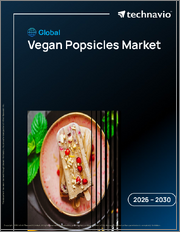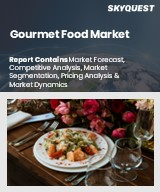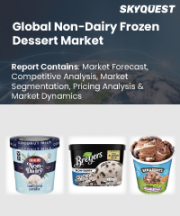
|
시장보고서
상품코드
1453922
아이스크림 시장 예측(-2030년) : 제품별, 유형별, 플레이버별, 유통 채널별, 지역별 세계 분석Ice Cream Market Forecasts to 2030 - Global Analysis By Product (Bars & Cones, Cups & Sticks and Other Products), Type (Dairy & Water-based and Vegan), Flavor, Distribution Channel and By Geography |
||||||
Stratistics MRC에 따르면, 세계 아이스크림 시장은 2023년 891억 달러 규모이며, 예측 기간 동안 6.21%의 CAGR로 성장하여 2030년에는 1,358억 달러에 달할 것으로 예상됩니다.
아이스크림은 크리미한 식감과 고급스러운 맛으로 전 세계적으로 사랑받는 냉동 디저트다. 아이스크림은 보통 유제품이나 코코넛 밀크, 아몬드 밀크와 같은 대체품으로 만들어지며, 설탕과 향료를 첨가하여 교반하고 얼려서 완성됩니다. 현대식 아이스크림의 발명은 16세기 이탈리아에서 시작된 것으로 알려져 있지만, 다양한 문화권에서 다양한 변형이 존재했습니다. 클래식한 바닐라 맛부터 이국적인 과일 맛까지, 아이스크림은 입맛을 돋우는 다양한 맛을 가지고 있습니다. 콘이나 컵에 담아 먹든, 쿠키에 끼워 먹든, 아이스크림은 시대를 초월한 사랑을 받고 있습니다.
2020년 1월 Dairy Reporter에 게재 된 설문 조사에 따르면 영국 소비자의 84%가 모든 맛보다 바닐라 맛을 선호하며, 2020년 5월 The Times of India에 게재 된 보고서에 따르면 인도에서는 인구의 60 - 65%가 유당 불내증이 있다고합니다. 불내증이 있다고 합니다. 이러한 유당불내증의 높은 보급률은 아이스크림을 포함한 기존 식품을 대체할 수 있는 채식주의자 수요에 기여할 것으로 예상됩니다.
마케팅 및 광고
아이스크림 시장에서 마케팅과 광고는 소비자 참여와 브랜드 인지도를 높이는 데 매우 중요한 역할을 합니다. 기업은 제품의 혁신성, 맛의 다양성, 고품질 원료를 강조하는 전략적 캠페인을 통해 소비자의 관심을 끌고 수요를 창출할 수 있습니다. 효과적인 마케팅은 고급 재료, 장인정신, 건강 지향적 옵션 등 다양한 브랜드의 고유한 판매 제안을 전달하고 구매 결정에 영향을 미칠 수 있습니다. 디지털 플랫폼, TV, 체험형 마케팅과 같은 광고 채널은 브랜드 인지도를 높이고 소비자와의 정서적 연결을 강화합니다.
건강에 대한 우려
아이스크림 섭취에 대한 건강상의 우려는 주로 설탕과 지방 함량이 높기 때문입니다. 이러한 성분의 과다 섭취는 비만, 당뇨병, 심장병의 원인이 될 수 있습니다. 또한 아이스크림에는 첨가물, 방부제, 인공 향료가 함유되어 있어 건강에 미치는 영향이 우려됩니다. 유당불내증과 유제품 알레르기의 확산은 특정 사람들에게 아이스크림 섭취를 더욱 제한합니다. 또한, 아이스크림의 칼로리 섭취량 증가와 영양소 섭취량 감소와의 연관성은 건강에 대한 우려를 더욱 부추기고 있습니다. 그 결과, 소비자들은 이러한 위험을 줄이기 위해 더 건강한 대안을 찾거나 아이스크림을 적당히 섭취하는 등 아이스크림의 위험성을 줄이기 위해 노력하고 있습니다.
프리미엄과 장인정신
아이스크림 시장에서 프리미엄 및 장인정신이 깃든 제품은 고급스럽고 독특한 냉동 디저트를 찾는 까다로운 소비자들을 만족시킬 수 있는 좋은 기회가 될 수 있습니다. 이러한 제품들은 종종 우수한 원료, 혁신적인 맛, 장인정신을 특징으로 하며, 대량 생산 제품과는 차별화됩니다. 소비자들은 고급스러운 경험과 미식가적인 맛에 대한 프리미엄을 지불할 의향이 있으며, 이는 장인 아이스크림 브랜드에 대한 수요를 주도하고 있습니다. 이 틈새 시장 부문을 활용함으로써 기업은 차별화를 꾀하고 브랜드 충성도를 높이며 식품업계의 프리미엄화 추세를 활용할 수 있습니다.
계절성
계절성 위협은 기본적으로 계절과 날씨의 변화로 인해 발생하는 수요와 매출의 변동입니다. 따뜻한 계절에는 일반적으로 아이스크림에 대한 수요가 급증하여 매출과 수익이 증가합니다. 그러나 추운 계절에는 수요가 감소하여 매출이 감소하고 수익이 감소할 수 있습니다. 이러한 주기적 패턴은 아이스크림 비즈니스에 도전이 될 수 있으며, 계절적 변동의 영향을 완화하고 연중 수익성을 유지하기 위해 재고, 생산 및 마케팅 전략을 효과적으로 관리해야 합니다.
COVID-19의 영향:
COVID-19는 여러 가지 측면에서 아이스크림 시장에 큰 영향을 미쳤습니다. 처음에는 사람들이 문을 닫은 상태에서 편안한 음식을 찾으면서 아이스크림에 대한 수요가 급증했습니다. 그러나 팬데믹이 진행됨에 따라 외식의 제한과 경제의 불확실성으로 인해 소비가 감소했습니다. 많은 아이스크림 가게와 아이스크림 가게가 문을 닫거나 손님이 줄어들어 매출에 영향을 미쳤습니다. 공급망의 혼란과 물류의 어려움은 생산과 유통에 영향을 미쳤습니다. 또한 소비자 행동이 건강 지향과 가정 활동으로 바뀌면서 구매 패턴에 영향을 미쳐 더 건강하고 장인정신이 깃든 제품에 대한 수요가 높아졌습니다.
예측 기간 동안 바&콘 부문이 가장 큰 비중을 차지할 것으로 예상
아이스크림 시장의 바&콘 부문은 이동 중에도 간편하게 즐길 수 있는 편리함과 휴대성으로 인해 이동 중에도 간식을 찾는 소비자들에게 어필하며 큰 성장세를 보이고 있습니다. 이 부문은 맛, 질감, 포장에 대한 혁신을 통해 다양한 소비자층을 끌어들이고 있습니다. 바 및 콘의 다용도성은 창의적인 커스터마이징과 참신함을 가능하게 하여 소비자의 관심을 더욱 높이고 있습니다. 고급스럽고 럭셔리한 아이스크림 경험에 대한 수요가 증가하면서 이 부문의 성장을 견인하고 있습니다.
아이스크림 팔러 분야는 예측 기간 동안 가장 높은 CAGR을 기록할 것으로 예상
아이스크림 전문점 분야는 고급스럽고 장인 정신이 깃든 아이스크림 맛에 대한 수요 증가로 인해 소비자들이 독특하고 고품질의 제품을 제공하는 전문점을 찾게 되면서 큰 성장을 이루었습니다. 체험형 다이닝의 부상과 함께 아이스크림뿐만 아니라 분위기, 교류 등을 즐길 수 있는 사교의 장으로서 아이스크림 가게의 인기가 급상승하고 있습니다. 또한, 아이스크림 가게에서는 고객이 원하는 맛의 조합과 토핑을 직접 만들 수 있는 커스터마이징 트렌드도 아이스크림 가게의 성장에 힘을 실어주고 있습니다.
가장 큰 점유율을 차지하는 지역:
북미 시장은 프리미엄 아이스크림과 장인 정신이 깃든 아이스크림 맛에 대한 소비자 선호도 변화로 인해 괄목할 만한 성장세를 보이고 있습니다. 건강 지향적 성향이 높아지면서 저지방, 무유제품, 유기농 아이스크림이 등장해 다양한 고객층에게 어필하고 있습니다. 미식가 아이스크림 샌드위치, 맞춤형 아이스크림 샌드위치, 맞춤형 선데이 바 등 새로운 디저트 경험의 인기가 높아지면서 매출 증가와 함께 업체 간 경쟁도 치열해지고 있습니다. 또한, 가처분 소득의 증가와 온라인 배달 서비스의 등장으로 소비자들이 다양한 아이스크림을 선택할 수 있는 편의성이 높아진 것도 시장 확대에 기여하고 있습니다.
CAGR이 가장 높은 지역:
아시아태평양은 최근 몇 년 동안 아이스크림 시장에서 괄목할 만한 성장세를 보이고 있습니다. 이러한 성장은 가처분 소득 증가, 소비자 선호도 변화, 인구 증가 등 다양한 요인에 기인합니다. 또한, 현지 취향에 맞는 혁신적인 맛과 포맷의 도입, 전통적인 인기 상품과 참신한 상품의 출현은 고품질 제품을 원하는 소비자의 취향 변화에 부응하고 있습니다.
무료 맞춤형 서비스:
이 보고서를 구독하는 고객은 다음과 같은 무료 맞춤화 옵션 중 하나를 사용할 수 있습니다:
- 기업 개요
- 추가 시장 기업의 종합적인 프로파일링(최대 3개사까지)
- 주요 기업 SWOT 분석(최대 3개사)
- 지역 세분화
- 고객의 관심에 따른 주요 국가별 시장 추정치, 예측, CAGR(주: 타당성 검토에 따른)
- 경쟁사 벤치마킹
- 제품 포트폴리오, 지리적 입지, 전략적 제휴를 기반으로 한 주요 기업 벤치마킹
목차
제1장 주요 요약
제2장 서문
- 개요
- 이해관계자
- 조사 범위
- 조사 방법
- 데이터 마이닝
- 데이터 분석
- 데이터 검증
- 조사 접근법
- 조사 소스
- 1차 조사 소스
- 2차 조사 소스
- 가정
제3장 시장 동향 분석
- 성장 촉진요인
- 성장 억제요인
- 기회
- 위협
- 제품 분석
- 신흥 시장
- 신종 코로나바이러스 감염증(COVID-19)의 영향
제4장 Porter's Five Forces 분석
- 공급 기업의 교섭력
- 구매자의 교섭력
- 대체품의 위협
- 신규 참여업체의 위협
- 경쟁 기업 간의 경쟁 관계
제5장 세계의 아이스크림 시장 : 제품별
- 바·콘
- 컵·스틱
- 팝스·튜브
- 브릭
- 기타 제품
제6장 세계의 아이스크림 시장 : 유형별
- 유제품 및 수성
- 비건
제7장 세계의 아이스크림 시장 : 플레이버별
- 바닐라
- 초콜릿
- 과일
- 쿠키 & 크림
- 기타 플레이버
제8장 세계의 아이스크림 시장 : 유통 채널별
- 소매
- 하이퍼마켓/슈퍼마켓
- 아이스크림가게
- 온라인
- 기타 유통 채널
제9장 세계의 아이스크림 시장 : 지역별
- 북미
- 미국
- 캐나다
- 멕시코
- 유럽
- 독일
- 영국
- 이탈리아
- 프랑스
- 스페인
- 기타 유럽
- 아시아태평양
- 일본
- 중국
- 인도
- 호주
- 뉴질랜드
- 한국
- 기타 아시아태평양
- 남미
- 아르헨티나
- 브라질
- 칠레
- 기타 남미
- 중동 및 아프리카
- 사우디아라비아
- 아랍에미리트
- 카타르
- 남아프리카공화국
- 기타 중동 및 아프리카
제10장 주요 발전
- 계약, 파트너십, 협업, 합작투자
- 인수와 합병
- 신제품 발매
- 사업 확대
- 기타 주요 전략
제11장 기업 개요
- Amul
- Blue Bell Creameries LP
- CAMAL Ltd Company
- Cold Stone Creamery
- Dairy Farmers of America Inc.
- Dairy Queen
- Dunkin Brands
- General Mills
- Inner Mongolia Yili Industrial Group Co. Ltd
- Lotte Corporation
- Nestle SA
- Smith Foods Inc.
- Unilever PLC
- Wells Enterprises Inc.
According to Stratistics MRC, the Global Ice Cream Market is accounted for $89.10 billion in 2023 and is expected to reach $135.80 billion by 2030 growing at a CAGR of 6.21% during the forecast period. Ice cream is a beloved frozen dessert enjoyed worldwide for its creamy texture and indulgent flavors. Typically made from dairy milk or alternative bases like coconut or almond milk, it's churned with sugar and flavorings, and then frozen to perfection. The invention of modern ice cream is often credited to Italy in the 16th century, although variations existed in various cultures. From classic vanilla to exotic fruit flavors, ice cream offers a wide range of tastes to tantalize the palate. Whether served in a cone, cup, or sandwiched between cookies, ice cream remains a timeless treat cherished by people of all ages.
According to a survey published in Dairy Reporter in January 2020, 84% of the consumers in the U.K. preferred the vanilla flavor over all the flavors. According to a report published in The Times of India in May 2020, 60% to 65% of the population in India was lactose intolerant. Such a high prevalence of milk intolerance is expected to contribute to the demand for vegan alternatives to conventional foods, including ice creams.
Market Dynamics:
Driver:
Marketing and advertising
In the ice cream market, marketing and advertising play pivotal roles in driving consumer engagement and brand recognition. Through strategic campaigns highlighting product innovation, flavor variety, and quality ingredients, companies capture consumer interest and stimulate demand. Effective marketing communicates the unique selling propositions of different brands, such as premium ingredients, artisanal craftsmanship, or health-conscious options, influencing purchasing decisions. Advertising channels, including digital platforms, television, and experiential marketing, create brand visibility and reinforce emotional connections with consumers.
Restraint:
Health concerns
Health concerns regarding the consumption of ice cream primarily revolve around its high sugar and fat content. Excessive intake of these ingredients can contribute to obesity, diabetes, and heart disease. Additionally, ice cream may contain additives, preservatives, and artificial flavors that raise concerns about their impact on overall health. The prevalence of lactose intolerance and dairy allergies further limits its consumption for certain individuals. Moreover, the association of ice cream with increased calorie intake and decreased nutrient consumption adds to its health concerns. As a result, consumers are increasingly seeking healthier alternatives or consuming ice cream in moderation to mitigate these risks.
Opportunity:
Premium and artisanal offerings
The premium and artisanal offerings in the ice cream market present a lucrative opportunity for businesses to cater to discerning consumers seeking high-quality, unique frozen treats. These offerings often feature superior ingredients, innovative flavors, and artisanal craftsmanship, setting them apart from mass-produced options. Consumers are increasingly willing to pay a premium for indulgent experiences and gourmet flavors, driving demand for artisanal ice cream brands. By tapping into this niche market segment, businesses can differentiate themselves, foster brand loyalty, and capitalize on the growing trend towards premiumization in the food industry.
Threat:
Seasonality
The seasonality threats are basically fluctuations in demand and sales that occur due to changing seasons and weather conditions. During warmer months, demand for ice cream typically surges, leading to higher sales and revenue. However, during colder seasons, demand dwindles, resulting in decreased sales and potential revenue loss. This cyclic pattern poses a challenge for ice cream businesses, requiring them to manage inventory, production, and marketing strategies effectively to mitigate the impact of seasonal fluctuations and maintain profitability throughout the year.
Covid-19 Impact:
The COVID-19 pandemic significantly impacted the ice cream market in several ways. Initially, there was a surge in demand for ice cream as people sought comfort foods during lockdowns. However, as the pandemic progressed, restrictions on dining out and economic uncertainties led to reduced consumption. Many ice cream shops and parlors faced closures or decreased foot traffic, affecting sales. Supply chain disruptions and logistical challenges impacted production and distribution. Additionally, shifts in consumer behaviour towards health-conscious choices and home-based activities also influenced purchasing patterns, with a growing demand for healthier or artisanal options.
The bars & cones segment is expected to be the largest during the forecast period
The Bars & Cones segment in the ice cream market has experienced significant growth due to their convenience and portability, appealing to consumers seeking on-the-go treats. The segment has witnessed innovation in flavors, textures, and packaging, attracting a wider demographic range. The versatility of bars and cones allows for creative customization and novelty, further driving consumer interest. The rising demand for premium and indulgent ice cream experiences has propelled the growth of this segment.
The ice-cream parlor segment is expected to have the highest CAGR during the forecast period
The Ice-cream Parlor segment has experienced substantial growth due to increasing demand for premium and artisanal ice cream flavors, prompting consumers to seek out specialized parlors offering unique and high-quality offerings. The rise of experiential dining has led to a surge in popularity for ice cream parlors as social destinations, where patrons can enjoy not just ice cream but also ambiance and interaction. Moreover, the customization trend has fueled growth, with parlors allowing customers to create their own flavor combinations and toppings.
Region with largest share:
North America has experienced significant growth, driven by changing consumer preferences towards premium and artisanal ice cream flavors. The rising trend of indulgence and desire for healthier options has led to the introduction of low-fat, dairy-free, and organic ice cream varieties, appealing to a broader customer base. The growing popularity of novel dessert experiences such as gourmet ice cream sandwiches and customizable sundae bars has boosted sales and heightened competition among manufacturers. Furthermore, increased disposable incomes and the emergence of online delivery services have also contributed to the market's expansion, making it more convenient for consumers to access a wide range of ice cream options.
Region with highest CAGR:
The Asia-Pacific region has witnessed notable growth in the ice cream market in recent years. This expansion can be attributed to various factors, such as increasing disposable incomes, changing consumer preferences, and a burgeoning population. Moreover, the introduction of innovative flavors and formats tailored to local tastes and, the emergence of traditional favorites and novel offerings has catered to the evolving preferences of consumers seeking high-quality products.
Key players in the market
Some of the key players in Ice Cream market include Amul, Blue Bell Creameries LP, CAMAL Ltd Company, Cold Stone Creamery , Dairy Farmers of America Inc, Dairy Queen, Dunkin Brands , General Mills , Inner Mongolia Yili Industrial Group Co. Ltd, Lotte Corporation, Nestle SA, Smith Foods Inc, Unilever PLC and Wells Enterprises Inc.
Key Developments:
In February 2024, Cold Stone Creamery, in a refreshing collaboration with JELL-O, introduces two new spring flavors, infusing the season with a unique twist on ice cream delights. Among the exciting offerings, the Banana Cream Pudding flavor stands out, featuring real JELL-O pudding mixed with creamy ice cream, ripe bananas, whipped topping, and Nilla Wafers.
In November 2023, General Mills India, a division of Minneapolis-based General Mills, Inc., earlier broke ground on a new $12 million baking plant in Nashik, Maharashtra. According to General Mills, the facility will serve as the epicenter for manufacturing the company's Pillsbury baking mixes for the Indian market.
Products Covered:
- Bars & Cones
- Cups & Sticks
- Pops & Tubes
- Brick
- Other Products
Types Covered:
- Dairy & Water-based
- Vegan
Flavors Covered:
- Vanilla
- Chocolate
- Fruit
- Cookies n Cream
- Other Flavors
Distribution Channels Covered:
- Retail
- Hypermarket/Supermarket
- Ice-cream Parlor
- Online
- Other Distribution Channels
Regions Covered:
- North America
- US
- Canada
- Mexico
- Europe
- Germany
- UK
- Italy
- France
- Spain
- Rest of Europe
- Asia Pacific
- Japan
- China
- India
- Australia
- New Zealand
- South Korea
- Rest of Asia Pacific
- South America
- Argentina
- Brazil
- Chile
- Rest of South America
- Middle East & Africa
- Saudi Arabia
- UAE
- Qatar
- South Africa
- Rest of Middle East & Africa
What our report offers:
- Market share assessments for the regional and country-level segments
- Strategic recommendations for the new entrants
- Covers Market data for the years 2021, 2022, 2023, 2026, and 2030
- Market Trends (Drivers, Constraints, Opportunities, Threats, Challenges, Investment Opportunities, and recommendations)
- Strategic recommendations in key business segments based on the market estimations
- Competitive landscaping mapping the key common trends
- Company profiling with detailed strategies, financials, and recent developments
- Supply chain trends mapping the latest technological advancements
Free Customization Offerings:
All the customers of this report will be entitled to receive one of the following free customization options:
- Company Profiling
- Comprehensive profiling of additional market players (up to 3)
- SWOT Analysis of key players (up to 3)
- Regional Segmentation
- Market estimations, Forecasts and CAGR of any prominent country as per the client's interest (Note: Depends on feasibility check)
- Competitive Benchmarking
- Benchmarking of key players based on product portfolio, geographical presence, and strategic alliances
Table of Contents
1 Executive Summary
2 Preface
- 2.1 Abstract
- 2.2 Stake Holders
- 2.3 Research Scope
- 2.4 Research Methodology
- 2.4.1 Data Mining
- 2.4.2 Data Analysis
- 2.4.3 Data Validation
- 2.4.4 Research Approach
- 2.5 Research Sources
- 2.5.1 Primary Research Sources
- 2.5.2 Secondary Research Sources
- 2.5.3 Assumptions
3 Market Trend Analysis
- 3.1 Introduction
- 3.2 Drivers
- 3.3 Restraints
- 3.4 Opportunities
- 3.5 Threats
- 3.6 Product Analysis
- 3.7 Emerging Markets
- 3.8 Impact of Covid-19
4 Porters Five Force Analysis
- 4.1 Bargaining power of suppliers
- 4.2 Bargaining power of buyers
- 4.3 Threat of substitutes
- 4.4 Threat of new entrants
- 4.5 Competitive rivalry
5 Global Ice Cream Market, By Product
- 5.1 Introduction
- 5.2 Bars & Cones
- 5.3 Cups & Sticks
- 5.4 Pops & Tubes
- 5.5 Brick
- 5.6 Other Products
6 Global Ice Cream Market, By Type
- 6.1 Introduction
- 6.2 Dairy & Water-based
- 6.3 Vegan
7 Global Ice Cream Market, By Flavor
- 7.1 Introduction
- 7.2 Vanilla
- 7.3 Chocolate
- 7.4 Fruit
- 7.5 Cookies n Cream
- 7.6 Other Flavors
8 Global Ice Cream Market, By Distribution Channel
- 8.1 Introduction
- 8.2 Retail
- 8.3 Hypermarket/Supermarket
- 8.4 Ice-cream Parlor
- 8.5 Online
- 8.6 Other Distribution Channels
9 Global Ice Cream Market, By Geography
- 9.1 Introduction
- 9.2 North America
- 9.2.1 US
- 9.2.2 Canada
- 9.2.3 Mexico
- 9.3 Europe
- 9.3.1 Germany
- 9.3.2 UK
- 9.3.3 Italy
- 9.3.4 France
- 9.3.5 Spain
- 9.3.6 Rest of Europe
- 9.4 Asia Pacific
- 9.4.1 Japan
- 9.4.2 China
- 9.4.3 India
- 9.4.4 Australia
- 9.4.5 New Zealand
- 9.4.6 South Korea
- 9.4.7 Rest of Asia Pacific
- 9.5 South America
- 9.5.1 Argentina
- 9.5.2 Brazil
- 9.5.3 Chile
- 9.5.4 Rest of South America
- 9.6 Middle East & Africa
- 9.6.1 Saudi Arabia
- 9.6.2 UAE
- 9.6.3 Qatar
- 9.6.4 South Africa
- 9.6.5 Rest of Middle East & Africa
10 Key Developments
- 10.1 Agreements, Partnerships, Collaborations and Joint Ventures
- 10.2 Acquisitions & Mergers
- 10.3 New Product Launch
- 10.4 Expansions
- 10.5 Other Key Strategies
11 Company Profiling
- 11.1 Amul
- 11.2 Blue Bell Creameries LP
- 11.3 CAMAL Ltd Company
- 11.4 Cold Stone Creamery
- 11.5 Dairy Farmers of America Inc.
- 11.6 Dairy Queen
- 11.7 Dunkin Brands
- 11.8 General Mills
- 11.9 Inner Mongolia Yili Industrial Group Co. Ltd
- 11.10 Lotte Corporation
- 11.11 Nestle SA
- 11.12 Smith Foods Inc.
- 11.13 Unilever PLC
- 11.14 Wells Enterprises Inc.



















